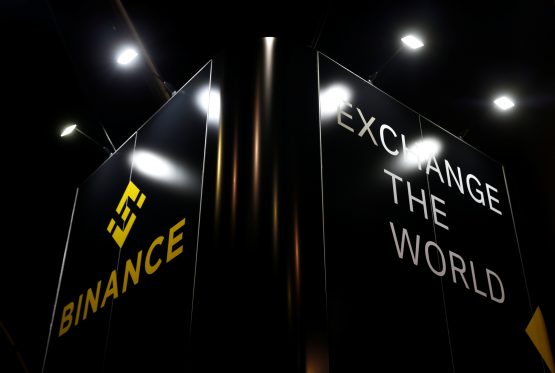FSCA's warning on Binance is the latest salvo against crypto operators

Binance, the world’s largest crypto exchange, has come under regulatory scrutiny in several countries.
The company says the notice was ‘perhaps a precautionary move’ and more of ‘a warning that crypto is not regulated’. Image: Darrin Zammit Lupi/Reuters
Earlier this month the Financial Sector Conduct Authority (FSCA) warned the public to be cautious in dealing with Binance, the world’s largest crypto exchange.
This follows similar warnings in the UK, Japan and Canada.
Head of enforcement at the FSCA, Brandon Topham, says Binance has engaged with the FSCA with a view to addressing the concerns raised by the regulator, though the warning still stands.
“Our concern is that Binance is offering products to South Africans for which you need a licence from the FSCA, and here we are talking about financial products such as derivatives rather than cryptos – which are unregulated.”
The notice says the FSCA received information that Binance Group, situated in Seychelles (which Binance disputes*) has a Telegram group that South Africans can join to gain access to the crypto exchange.
“The FSCA would like [to] caution that in addition to this entity not being authorised to provide any financial services or business, crypto-related investments are currently not regulated by the FSCA or any other body in South Africa. As a result, if something goes wrong, you’re unlikely to get your money back and will have no recourse against anyone,” says the FSCA notice.
The regulator says Binance is not authorised to give financial advice or intermediary services in SA in terms of the Financial Advisory and Intermediary Services (Fais) Act.
Binance grew from nothing to the world’s largest crypto exchange in four years, generating daily volumes of around $2 billion. The exchange was established in 2017 by Chaopeng Zhang, a Chinese-Canadian coder also known as CZ, who previously worked at the Tokyo Stock Exchange and Bloomberg. He also spent time as an employee of McDonald’s. According to Forbes, his net worth is around $1.9 billion, virtually all of this in the form of cryptocurrencies.
Binance timed its entry to the market in 2017 to coincide with a huge upswing in crypto adoption.
While initially limiting its offering to cryptos, it later diversified into trading forex pairs and a range of derivatives, and this is what appears to have brought it unwanted attention from regulators.
It recently announced that it would discontinue certain services in Singapore after falling under regulatory scrutiny there.
Binance says it is working with regulators across the globe to ensure it remains compliant.
Brenton Naicker, business development manager for Binance Africa, says the company has been in contact with the regulator, and the notice issued by it was perhaps a precautionary move and “was more a warning that crypto is not regulated – with specific reference to us.” The reasons for the FSCA warning were explained to customers, and has not had a negative impact on the business.
In response to the FSCA warning, Binance issued the following statement:
“We are aware of the notice published by the South Africa FSCA on September 3. At the outset, we would like to take this opportunity to clarify that Binance.com does not provide financial advice or render any intermediary services. We have clearly set this out in our terms of use, which can be found here at: https://www.binance.com/en/terms.
As the FSCA stated in its notice, cryptocurrency-related activities are currently not regulated by it or any other body in South Africa. In order to bridge the gap and to uphold our commitment to protecting our users, Binance.com has set stringent and industry-first standards. For example, Binance.com has recently implemented the Intermediate Verification requirement for all users which supports Binance’s Know Your Customer (KYC) and Anti-Money Laundering (AML) efforts. In addition, to ensure that our users are as protected as possible, since 2018, Binance.com has implemented a Secure Asset Fund for Users (SAFU) where we allocate 10% of all trading fees received into it to offer protection to our users and their funds in extreme cases.
Furthermore, Binance.com is committed to taking a collaborative approach in working with regulators and law enforcement globally, and in particular, Binance.com is continuously collaborating with the FIC (Financial Intelligence Centre), the major regulator of financial crimes in South Africa. Binance.com is registered with the FIC as a voluntary self-disclosure institution. As a member of this programme, Binance complies with the FIC Act obligations relating to establishing and verifying of clients’ identities, record keeping and reporting suspicious or unusual transactions in terms of section 29 of the FIC Act.
In the course of 2021 to date, Binance.com has collaborated with the FIC on over 462 cases, and in turn, we understand that the FIC collaborates with the FSCA for further investigations when necessary. We have reached out to the FSCA for more clarification on their statement and look forward to working with them and addressing any concerns they may have.
In terms of social media outreach, we have an official Binance South Africa Telegram community which promotes blockchain education and community announcements.
*It is not intended, nor does it provide any financial advice. This community is moderated by staff, admins and Binance ‘angels’. For completeness, we would also clarify that we do not have an associated entity named Binance Group in Seychelles.”

